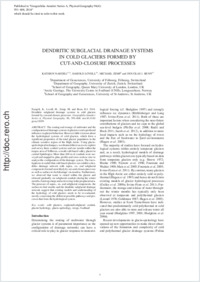Dendritic subglacial drainage systems in cold glaciers formed by cut-and-closure processes
- Naegeli, Kathrin Department of Geosciences, University of Fribourg, Switzerland - Department of Geography, University of Zurich, Switzerland - Arctic Geology, The University Centre in Svalbard (UNIS), Longyearbyen, Norway
- Lovell, Harold School of Geography, Queen Mary University of London, UK - Arctic Geology, The University Centre in Svalbard (UNIS), Longyearbyen, Norway
- Zemp, Michael Department of Geography, University of Zurich, Switzerland
- Benn, Douglas I. Arctic Geology, The University Centre in Svalbard (UNIS), Longyearbyen, Norway - School of Geography and Geosciences, University of St Andrews, UK
-
2014
Published in:
- Geografiska Annaler: Series A, Physical Geography. - 2014, vol. 96, no. 4, p. 591–608
English
The routing and storage of meltwater and the configuration of drainage systems in glaciers exert a profound influence on glacier behaviour. However, little is known about the hydrological systems of cold glaciers, which form a significant proportion of the total glacier population in the climate sensitive region of the High Arctic. Using glacio-speleological techniques, we obtained direct access to explore and survey three conduit systems and one moulin within the tongue area of Tellbreen, a small cold-based valley glacier in central Spitsbergen. More than 600 m of conduits were surveyed and mapped in plan, profile and cross-section view to analyse the configuration of the drainage system. The investigations revealed that cold-based glaciers can exhibit a dendritic drainage network with supra-, en- and subglacial components formed most likely by cut-and-closure processes as well as surface-to-bed drainage via moulins. Furthermore, we observed that water is stored within the glacier and released gradually via subglacial conduits during the winter months, forming a large and active icing in the proglacial area. The presence of supra-, en- and subglacial components, the surface-to-bed moulin and the dendritic subglacial drainage network suggest that existing models and understanding of the hydrology of cold glaciers needs to be re-evaluated, mostly concerning the different possible pathways and processes that form the hydrological system.
- Faculty
- Faculté des sciences et de médecine
- Department
- Département de Géosciences
- Language
-
- English
- Classification
- Hydrology
- License
-
License undefined
- Identifiers
-
- RERO DOC 234239
- DOI 10.1111/geoa.12059
- Persistent URL
- https://folia.unifr.ch/unifr/documents/304135
Statistics
Document views: 131
File downloads:
- pdf: 214
